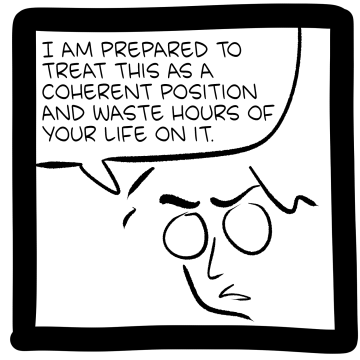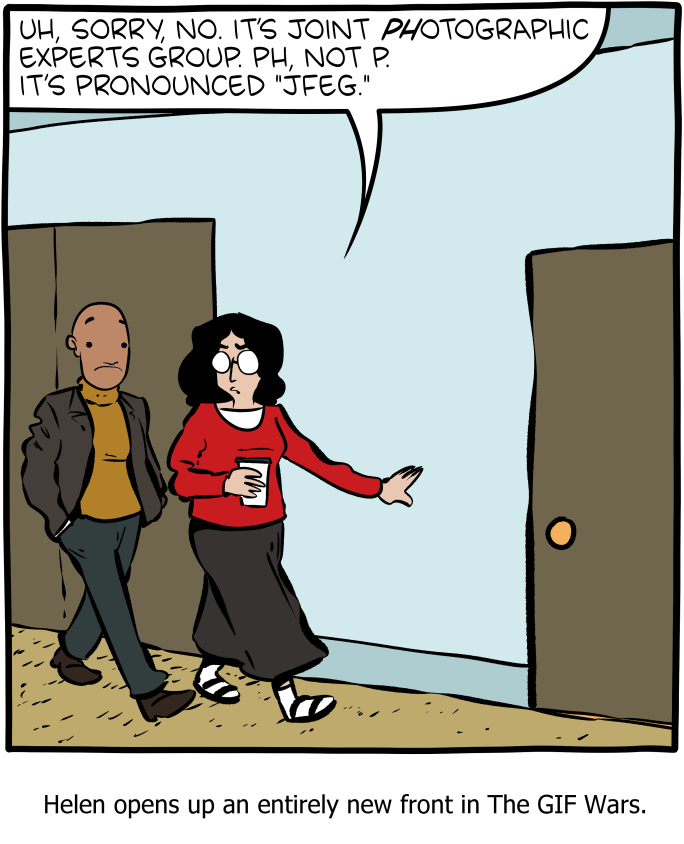this post was submitted on 27 Nov 2023
1853 points (98.0% liked)
Comic Strips
13207 readers
3138 users here now
Comic Strips is a community for those who love comic stories.
The rules are simple:
- The post can be a single image, an image gallery, or a link to a specific comic hosted on another site (the author's website, for instance).
- The comic must be a complete story.
- If it is an external link, it must be to a specific story, not to the root of the site.
- You may post comics from others or your own.
- If you are posting a comic of your own, a maximum of one per week is allowed (I know, your comics are great, but this rule helps avoid spam).
- The comic can be in any language, but if it's not in English, OP must include an English translation in the post's 'body' field (note: you don't need to select a specific language when posting a comic).
- Politeness.
- Adult content is not allowed. This community aims to be fun for people of all ages.
Web of links
- !linuxmemes@lemmy.world: "I use Arch btw"
- !memes@lemmy.world: memes (you don't say!)
founded 2 years ago
MODERATORS
you are viewing a single comment's thread
view the rest of the comments
view the rest of the comments


Somehow, I can tolerate "jpheg" much easier than the forsaken "jif."
Jif is where it's at. Peanut butter and image format? Yes please
But Jif in Australia is a cleaning solution - can we have different pronunciations based on country?
No need, it's Gif. Heathens be damned.
Y'all love diminutives, call them jiffies?
Jiffy is already an abstract measurement of time though
Give me about four jiffies, I’ve just got to finish wiping my ass
Sounds more than fair. We can't agree to a person on our sounds anyway.
No. You cannot.
The creators literally referenced this early on "choosy devs choose gif" like the jiff peanut butter commercial.
this goes deeper than I thought!
Yes, and that’s stupid.
It’s not ‘Jraphical Image Format’. Gah!!!
That's a lot of peanut butter
You don't pronounce the word for imagery as "jrafics?" How odd.
Giraffics
Stupid long horses
By that standard, the comic is right and we should say j-feg
Do you also pronounce origin like Oregon
"Jif" is the original pronunciation. It is a pun, a play on the word "jif" short for "jiffy" meaning a short amount of time, as in "I'll send it to you in a gif". The newer pronunciation has become popular based on the fallacious reasoning that an acronym should be pronounced the same as its constituent words, which isn't a thing at all.
Language evolves, and both pronunciations are common enough to be considered acceptable. The only way to be wrong about how to pronounce the word is to claim one of the pronunciations is wrong.
Become popular? It's been popular roughly for the lifespan of the format. It's hardly language's fault the developer wanted to make an unfunny reference to a since forgotten peanut butter slogan.
On the other hand linguistics indicate a hard g sound with the construction of the word, constituent words aside. Plenty of four letter words starting with the gi combo have a hard g, including but not limited to gift which you may notice is very similarly constructed.
Whatever else the English language may throw at us, people appreciate consistency because we can make some sense of the world. A hard g is the consistent, predictable, sensible choice for the limited availability of those virtues English offers.
There exists other words that start with gi but use the soft g, gin for example. But regardless, the pronunciation of one word is not determined by the pronunciation of other unrelated words.
In English? Yes. In other, more structured and sane languages? No.
I'm gonna stop you there, because I've been using the format for about 30 years, and people only started using the new pronunciation in the last 10-15.
Everything you said about linguistics is entirely crap. English is not a proscriptive language. English linguistics doesn't indicate anything at all. It is descriptive, and is anything but consistent. There are no rules about word construction or pronunciation. Words are pronounced the way they are understood, and if you are understood then you have pronounced them correctly.
You could argue that the original pronunciation is archaic, like "encyclopaedia," but the problem there is that the word itself is like 35 years old, and there are people like me who have been using the word since there was only one acceptable pronunciation who aren't likely to change.
I've been using the word since the mid 90s and it's always been hard G for me.
I don't say that to suggest that you or anyone else are wrong to say it with a soft G (although my brain cringes each time I hear it), but since I don't think I invented the hard G pronunciation I think claiming it's a recent thing is a fallacious argument against the hard G.
Nobody invented the mispronunciations, it just happens, which is why the manual included a guide. The inventor of the word (and the format) had to tell people how it was pronounced and why he chose the name, just like every other brand name.
What is recent is the fallacious arguments related to how acronyms are supposed to be pronounced, part of a larger trend towards obstinate and belligerent defense of an objectively and demonstrably false argument. The internet has made people feel like their opinions are just as valid as facts.
In the 90s, we nerds used technical terms like a shiboleth to separate other nerds from what the French call "les incompétents." But it's unlikely anyone would have corrected you back then, because doing so was considered impolite and elitist.
I see it as part of what Colbert called "truthiness." There is no rule for how the word should be pronounced, but it feels like there should be, which is why the argument is so often repeated. The feeling of being right is more important than the reality of ambiguity, and people seek out validation of their presuppositions. It's that overconfidence that fosters animosity towards debate, which is why people get so heated about silly things like this.
As someone else pointed out already, this is untrue. While it may not have been popular in your circles, it definitely was in others. I've been saying it with a hard g as long as you have with a soft and I'm not the originator either.
They absolutely do. That's why you can sound out a word you've never seen before. You may not always be right when you do because they indicate, they don't define.
There are, there are just exceptions. For example, an e at the end of the word is silent. I'm certain you can give me a word where it's not, but there are at least six in this paragraph alone where it is.
In this logic if someone has been pronouncing a word all their life with a single pronunciation and travels to another location with a much different accent they can only now be pronouncing the word wrong.
If understanding is also the only metric then a hard g would still be preferable. Not only does a written g tend to make people lean to a hard g in my experience, but there's more words that could be mistaken for a soft g pronunciation.
Could I not argue that the original pronunciation has fallen out of favor?
Is there a time requirement for pronunciations to become archaic?
Which isn't a time that existed, as we've established
Given your stance on language this is absolutely a you problem. If the rest of us collectively decided to understand it as only with a hard g, you would not be understood and therefore be pronouncing it wrong by your own logic.
One of the most common words with a final "e" in that paragraph is "the" which not only has a final "e" sound, but has two different final "e" sounds depending on the context: "the end" uses a /ði/ pronunciation but "the word" uses a /ðə/ pronunciation. English is very stupid.
But, I agree with your assessment. English has rules, or at least patterns. "G" is most often hard, not soft, because "J" is available for the soft version, but there's no alternative for the hard version. English tends to follow patterns, and "gift" has a hard g, and it (and words based on it) are the only ones that start with "gif", so every "gif" word is hard. Because "t" (unlike "e") can't change the sounds before it, the pattern says that "gif" should have a hard "g".
If it were "gir", then there would be more debate. The word "giraffe" has a soft "g" but "girl" has a hard one, so the pattern is more muddy.
Also, people who coin words don't get to decide how they'll be pronounced. They can certainly try, but they'll often lose. There are plenty of words in English borrowed from other languages that not only sound nothing like the original language, but that sound nothing like they'd sound if they were English words. For example, "lingerie". It's a French word, but the English pronunciation sounds nothing like a French word. In fact, if someone just sounded out the word as if it were an English word, they'd probably get much closer to the French pronunciation than the awful "lawn-je-ray" which is the current accepted English pronunciation (though, they'd probably assume a hard "g" sound).
In this case, it's too bad that Steve Wilhite didn't have a background in linguistics or he would have realized that people would see "gif" and assume a hard "g". It was a losing fight from the start because he either didn't understand the assumptions people would have when they saw those letters, or he thought that somehow he could successfully fight the tide all by himself.
Your illustration using the word “the” here is awesome. Particularly the alternative pronunciations. I would also like to add the well known words “be”, “he”, “she” and “me” into the mix.
Jift.
Yep. Jiffy is only used for peanut butter. Great point!
You can find plenty of places where the claim is that it's a soft g because "choosey devs choose gif".
Where jiffy is used is irrelevant in that case.
It's been popular in use but casual everyday people weren't always bringing them up in conversation.
English is not consistent, accept that. You can say gif but I'll continue to call it gif.
This is the real answer. Both are correct and that's that. It can be gif as in image, or gif as in graphic.
It's Gif and I don't care what anyone says
I don't care either. Now excuse me while I go gerk off.
Dijusting.
Oh yeah well I say drink more Ovaltine
Why do they call it Ovaltine? The container is round. The mug is round. They should call it Roundtine.
The approximately equal amount of upvotes and downvotes this comment received pretty much sums up the entire gif wars.
The newer pronunciation has become popular based on their internalization of the obscure patterns of English pronunciation, informed by the most similar word: "gift" which uses a hard g. Everyone I know of started saying it with a hard g because that's what made sense based on the spelling, long before hearing the weird thing about constituent words.
Nobody pronounced LASER as Lah-seer, which you'd have to do if you used "A as in Amplification" an "E as in Emission".
always remember that yiff is a valid option
I don't like the color noise, so yeah it's fine with me.